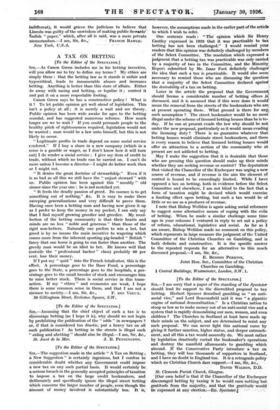• [To the Editor of the SPECTATOR.] Sin,—The suggestion made
in the article "A Tax on Betting
New' Suggestion" is certainly ingenious, but I confess to Considerable doubt whether any Government could impose a new tax on any such partial -bails. It would certainly be,
serious breach in the generally accepted 'principles of taxation to impose a tax on the large credit bookmakers, and deliberately and specifically ignore the illegal street betting which concerns the larger number of people, even though the ttinotint of inorieY inVcilVed 'is 'substantially less. It - is, however, the assumptions made in the earlier part of the article to Which I wish to refer. - One sentence reads : "The opinion which Sir Henry Cautley expressed in 1923 that it was practicable to tax betting has not been challenged." I would remind your readers that this opinion was definitely challenged by members of the Select Committee. The resolution which expressed a
judgment that a betting tax was practicable was only carried, by a majority of two in - the Committee, and the Minority, Report submitted by Mr. Isaac Foot definitely challenges' the idea that such a tax is practicable. It would also seem', aecessary to remind those- who are discussing the question that a. majority of the Select Committee declared against', the desirability of a tax on betting. .
Later in the article the proposal that the Government should license a considerable number of betting offices .isa, discussed, and it is assumed that if this were done it wouldl mean the removal from the streets of the bookmakers who are,;• at present operating there. What ground is there for an such assumption ?- The street bookmaker would be no more illegal under the scheme of licensed betting houses than he is to- day. If he can at present evade the law why should he not under the new proposal, particularly as it would mean evading the licensing duty ? There is no guarantee whatever that betting houses would eliminate street bookmakers, and there is every reason, to believe that licensed betting houses would offer an attraction to a section of the community who at present are not addicted to betting.
• May I make the suggestion that it is desirable that those, who are pressing this question should make up their minds whether they are seeking revenue or control? The deputation that visited the Chancellor of the Exchequer was urging a new source of revenue, and if revenue is the aim the element of control is bound to be exceedingly limited. While I have opposed a tax on betting, both in evidence before the Select Committee and elsewhere, I am not blind to the fact that a form of taxation might be devised which would exercise a limiting effect upon betting, but such a tax would be of little or no use as a producer of revenue.
I note that Bishop Welldon is again asking social reformers to suggest some alternative means of coping with the evils of betting. When he made a similar challenge some time ago in your columns I ventured in reply to set out a policy of reform, educational, legislative and social. As far as I am aware, Bishop Welldon made no comment on this policy, which represents in large measure the judgment of the United Committee of the Christian Churches on Gambling, and is both definite and constructive. It is the specific answer to the repeated requests for an alternative to this much discussed proposal.—I am, Sir, &c., ' E. BENSON PERKINS, Joint Hon. See., Committee of the Christian Churches on Gambling.
1 Central Buildings, Westminster, London, S.W .1.


















































 Previous page
Previous page